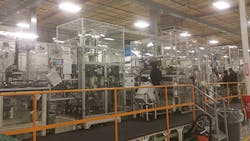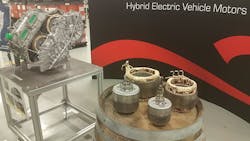Not long after Ford Motor Co. decided to increase production of its hybrid electric vehicles in late 2011, officials opened discussions with the company’s engine supplier, Toshiba International Corp., about shifting production closer to home. Detroit was considered, but not for long. Toshiba already had a perfect location, albeit a little farther down the road: Houston.
Toshiba produces far more than televisions and laptops, of course. Inside its sprawling 1.2 million-square-foot facility northwest of downtown Houston, its focuses include other power electronics, transmissions and distribution systems, and motors and drives — including, since 2012, those HEV engines for Ford. While the facility is one time zone, five states and more than 1,300 miles south of Detroit, it’s plenty close thanks to the Port of Houston, normally one of the two largest in the country depending on the measurement, and the company’s existing facility.
When far more companies than not are looking for the lowest-cost production country, Toshiba has already found that in North America, it can actually produce and deliver the product at a better cost here, particularly when the cost of transportation and the inventory cost are taken into consideration.
Matt LaWell, IndustryWeek
So much better, in fact, that its production of engines and transmissions could jump in the next year or two. Part of that increase would be thanks to recent announcements that Ford will expand its hybrid-first line to as many as 13 models, but at least as much would be because of an incredibly high quality of work. Working with a lead time of three days, Toshiba shipped about 1.2 million parts to Ford during its most recent quarter without a single defect.
What are the keys to successfully reshoring? As plant manager Roberto Heredia walked across the production floor, he pointed out the robots from Epson and Nachi, and the production line layout, before ultimately turning to the people. In four years, just one employee has left the HEV production line, and that was because of a move out of Texas. “Nothing beats the human eye,” Heredia said while looking up at a string of dozens of workers inspecting engines. “We’ve tried.”
Beyond people, potential reshoring projects need to consider the real costs of international shipping and time limits, and find the right spot. Houston works for Toshiba because of its massive facility — the sprawling campus opened in the early 1970s and was initially used as a warehouse — and its location 28 miles northwest of the Port of Houston. “We just had to move equipment,” Heredia said. “We already knew how to set it up.”
What are the odds that more manufacturers — especially more that are already headquartered outside the United States — move some operations here? Not high, to be sure, but consider, for an example, that Keer Group, a Chinese textile company, opened a new facility just last year in South Carolina. The wage gap is narrowing, the roads are better, the ports are better, and the land and energy are cheaper. Perhaps Toshiba will wind up setting a fortuitous trend.
About the Author
Matt LaWell
Staff Writer
Staff writer Matt LaWell explores news in manufacturing technology, covering the trends and developments in automation, robotics, digital tools and emerging technologies. He also reports on the best practices of the most successful high tech companies, including computer, electronics, and industrial machinery and equipment manufacturers.
Matt joined IndustryWeek in 2015 after six years at newspapers and magazines in West Virginia, North Carolina and Ohio, a season on the road with his wife writing about America and minor league baseball, and three years running a small business. He received his bachelor's degree in magazine journalism from Ohio University.

